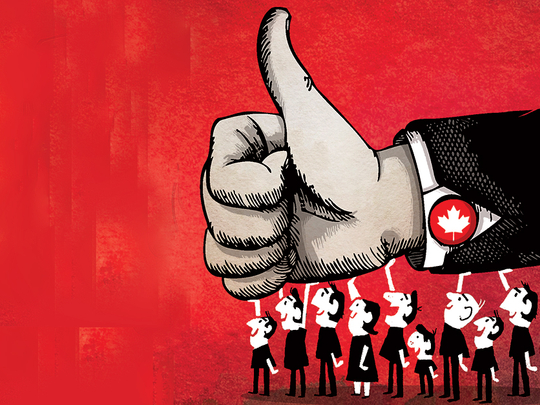
In a dramatic general election, the Canadian Liberal party has climbed back from a devastating defeat in 2011 to win a majority under the new leadership of Justin Trudeau and now holds 54 per cent of the seats. Amid much relief from the centre and the left, the Conservative leader Stephen Harper ends his nine-year term as prime minister. The other big loser this year, however, is the New Democratic Party (NDP), traditionally left of the Liberals, who formed the official opposition for the first time in 2011 after a surprise success known as the “Orange Wave”.
As a friend eloquently summed up left-wing sentiments: It is sad that red has eaten orange, but not sad that red has eaten blue.
But celebration hats on first. The ousting of Harper is a victory for democracy, equality, the environment and the economy. While much power is consolidated in the position of the prime minister, unwritten convention has historically dictated that it is not wielded in a totalitarian way. Honour systems only work with honourable people. During his tenure, Harper strove to put as indelible an ideological mark on Canada as possible. He prorogued parliament twice for political gain — first to avoid a potential vote of non-confidence and second to avoid House of Commons scrutiny of transfer of Afghan detainees at high risk of torture. He was ruled in contempt of parliament for withholding information on crime legislation, purchase of war jets and impact of corporate tax cuts.
But even putting this underhand and undemocratic mode of politics aside, his official policy has done Canada untold harm: He yoked Canada’s economy to Alberta’s oil industry; Gutted the country’s environmental legislation; silenced scientists; defunded or criminalised more than 100 progressive organisations; all but waged war on First Nations; and, taking credit where none was due for keeping Canada strong during the global recession, he implemented endless, ideologically driven austerity measures, severely damaging Canada’s once strong economy. I could go on.
The Conservatives’ attempts, via (highly amusing) campaign videos, to convince the electorate that Trudeau, the son of an iconic former prime minister, was “just not ready” for office, have failed. Canada has declared Justin fully baked and ready to eat. And I think it would be remiss of me not to point out that this election leaves Canada with one of the world’s prettier premiers.
But beauty, as the Irish say, will not boil the pot. There are pros and cons to Trudeau’s policy. While he is promising austerity easing and government spending to stimulate the economy, he’s also running on a platform of unnecessary tax breaks for the middle classes. While his stance on multiculturalism has been inclusionary, he voted in favour of the Conservatives’ bizarre and racially motivated Zero Tolerance for Barbaric Cultural Practices Act, S7. Furthermore, his liberal credentials clearly don’t extend to anti-surveillance — the party also voted in favour of the C51 “anti-terrorism” legislation , which increases government powers to spy on civilians.
So there’s certainly much to mourn in the death of the NDP’s Orange Wave. What happened? Many commentators seem to think that leader Thomas Mulcair conceded the party’s 2011 advantage in Quebec by failing to speak out against the niqab (face veil). For those of you who have not been following the Canadian election, Zunera Ishaq’s right to wear the niqab during her citizenship ceremony became a divisive issue.
Some called it a smokescreen, but the truth is that the supposed tension between women’s rights and multiculturalism has dominated Quebec political discourse since 2013, when the Parti Quebecois proposed a charter of values that would limit the wearing of religious symbols by state personnel. The charter was implicitly aimed at the province’s Muslims, with the Jewish community caught in the crossfire. Thankfully, the bill failed. But it had much popular support and it is not unreasonable to suggest that Harper’s instrumentalisation of the niqab issue was designed to weaken the left in Quebec.
However, I don’t think this is what actually played out. If it were, we would see the NDP conceding most power to the Conservatives or the Bloc Quebecois, who were anti-niqab, instead of to the Liberals, who were admirable in their defence of Canadian women’s rights to wear whatever they want. And while the Conservatives and the Bloc made small gains in Quebec, it was the Liberals who cleaned up. It seems more likely to me, then, that the NDP’s policy mistake was to move towards the centre economically, promising a balanced budget.
Overall, however, the ABC (Anything But Conservative) mindset was the primary determinant in the NDP’s demise. Many seasoned, popular NDP candidates across Canada lost their seats (eg Peter Stoffer, Jack Harris), not because of policy issues, but due to strategic voting. Unity was needed to topple Harper, and the polls indicated that Trudeau was a safer bet.
With this analysis, then, I think we can read the 2015 election as a victory for Canada’s left. The message that the country has sent its new leader is clear: There is appetite for a politics of anti-austerity; this is a Canada that believes in the rights of all of its citizens and residents. In short, it is Trudeau’s leftist, as opposed to centrist, tactics that have won him this victory, and he would do well to be cognisant of that as he restores Canada to the egalitarian, ethical and honourable democracy that it once was — the democracy of which Canadians are right to be proud of.
— Guardian News & Media Ltd
Emer O’Toole is assistant professor of Irish performance studies at the School of Canadian Irish Studies, Concordia University. She tweets at @Emer_OToole










